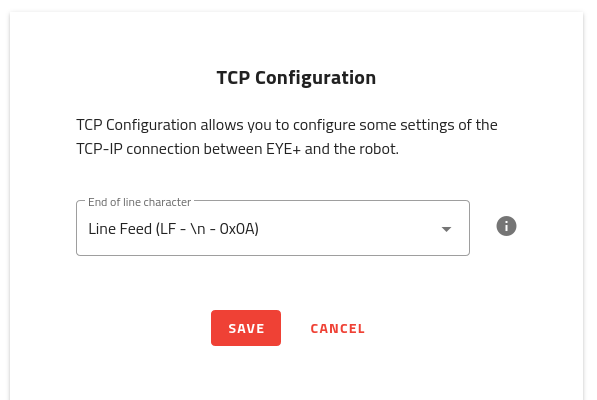Warning
You are reading an old version of this documentation. If you want up-to-date information, please have a look at 5.3 .Communication
Access the communication configuration through and Communication.
From here, you can change the configuration settings of several devices, namely Fieldbus (in case there is one plugged in), Robot and Network. Make sure that your configuration settings are compatible with the configuration of the devices connected to EYE+. They must be on the same network.

Fig. 145 COMMUNICATION main page
Fieldbus Module section
The Fieldbus Module section shows information related to the optional Fieldbus Module. This section only appears when a Fieldbus module is plugged in.

Fig. 146 COMMUNICATION Fieldbus Module section
Module type, type of the module (i.e. the Fieldbus technology supported)
Ethernet port 1, Information related to the Ethernet port 1 (next to LEDs).
Ethernet port 2, Information related to the Ethernet port 2.
Other(s), various other information related to the specific Fieldbus Module installed.
Robot TCP/IP section
The robot configuration page consists of two sub-sections:

Fig. 147 COMMUNICATION Robot TCP/IP section
Robot Configuration
The default settings of the Robot port are presented in Table 26.
Ethernet port |
IP address |
Subnet mask |
Ports |
|---|---|---|---|
Robot |
192.168.0.50 |
255.255.255.0 |
7171, 171, 17171 |
This configuration means that the IP address of your robot/PLC must be between 192.168.0.1 and 192.168.0.254 except 192.168.0.50.
If this IP address range is not compatible with your robot/PLC configuration, you can change the IP address and subnet mask of the EYE+ Controller to be on the same network as your robot/PLC.
Note
EYE+ Controller listens to the three ports defined in Table 26 simultaneously, we recommend to choose 7171, however depending on your requirements you might choose another one from the list.
TCP Configuration
This section allows you to select a different end of line delimiter. This might be required depending on your robot and/or PLC.

Three different options are available:
LF, end of line delimiter is the special character LF (i.e
\n, ASCII code0x0A)CR + LF end of line delimiter is the special character CR + LF (i.e
\r\n, ASCII codes0x0D 0x0A)CR end of line delimiter is the special character CR (i.e
\r, ASCII code0x0D)
The default end of line delimiter used by EYE+ Controller is LF.
Note
When changing this setting, any open connection will be forcefully terminated.
Network section
The Network section allows you to modify the Configuration port. The default settings of the Configuration port are presented in Table 27.

Fig. 148 COMMUNICATION Network section
Ethernet port |
Default IP address |
Default subnet mask |
Default gateway |
|---|---|---|---|
Configuration |
192.168.1.50 |
255.255.255.0 |
0.0.0.0 |
This default configuration means that your computer can only connect via direct connection and the IP address of your computer’s port must be between 192.168.1.1 and 192.168.1.254 except 192.168.1.50.
If you want to connect EYE+ to your company network via indirect connection, you need to change the IP address, subnet mask and default gateway of the Configuration port of EYE+ to match your company network configuration.
It is also possible to use the DHCP configuration mode. The DHCP server will automatically give an IP address, subnet mask and gateway to the EYE+ Configuration port.
Note
To find out the settings applied by the DHCP server, you must ask your company’s IT department which IP address has been linked.